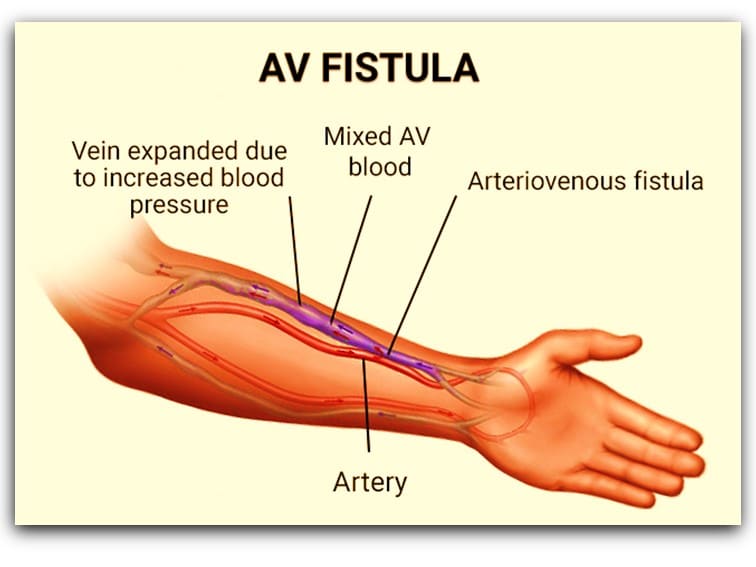The Arteriovenous (AV) fistula serves as a lifeline for individuals who require ongoing hemodialysis.
Fistula should be your first choice as it lasts longer, provides better dialysis, and lesser complications like infections. You must take care of your vascular access – that is, fistula. Your nephrologist and dialysis care team will teach you the necessary steps of how to keep your fistula working for long.
Why is Fistula Maintenance Important?
Proper maintenance of fistulas is crucial for the following reasons:
Preventing Infections: By keeping the fistula clean and free from contamination, the risk of infection is significantly reduced. Infections can lead to complications and hinder the normal functioning of the fistula.
Prolonging Lifespan: By taking appropriate measures to care for the fistula, its lifespan can be extended. This reduces the need for frequent interventions such as surgical repairs or temporary dialysis lines.
Now that we understand the importance of maintaining fistulas let’s delve into the specific strategies to keep them in optimal working condition.
How to keep your fistula working for long
1. Keeping Fistula Site Clean and Dry
One of the most fundamental aspects of fistula maintenance is to ensure proper hygiene and cleanliness of the site. Follow these steps to keep the fistula site clean:
Gently wash the area around the fistula with mild antibacterial soap and water.
Pat the area dry using a clean towel or sterile gauze.
Avoid applying any creams, lotions, or powders near the fistula site unless advised by your healthcare professional.
Monitor the site for any signs of infection, such as redness, swelling, or discharge. If you notice any abnormalities, contact your healthcare provider immediately.
2. Protecting the Fistula from Trauma
Fistulas are delicate and can be easily damaged by accidental trauma. To prevent injury to the fistula site:
Avoid wearing tight clothing or accessories that could rub against or compress the fistula.
Be cautious while engaging in physical activities or sports to minimize the risk of trauma.
If you notice any signs of trauma, such as bleeding or pain, seek medical attention promptly.
3. Maintaining Adequate Hydration
Staying hydrated is essential for maintaining blood flow in the fistula.
Drink adequate water throughout the day, as recommended by your nephrologist.
Low blood pressure can cause the clotting of blood in the fistula. Monitor your blood pressure regularly
If you have any diarrhea, vomiting, or any other condition causing excess fluid loss-stop your blood pressure tablets and seek medical advice immediately.
4. Avoiding Excessive Pressure on the Fistula
Excessive pressure on the fistula can reduce blood flow and hinder its function.
To avoid unnecessary pressure:
Sleep on the side opposite the fistula arm to reduce pressure.
Avoid carrying heavy objects that could put a strain on the fistula.
5. Regular Follow-up with your doctor
Maintaining regular contact with your doctor is important to:
Assess the functioning and condition of the fistula.
Receive guidance on proper maintenance techniques.
Discuss any changes in symptoms or concerns.
Frequently Asked Questions (FAQs)
1: Can a fistula be used immediately after its creation?
The AV fistula must mature before it can be utilized, which generally takes an average of 2 months from the date of surgery. If you are unable to use the fistula after 3 months, then it indicates trouble. Please consult your nephrologist or the surgeon immediately.
2: How often should I clean the fistula site?
The fistula site should be cleaned daily using mild soap and water. Ensure that you follow proper hygiene practices and keep the site clean to prevent infections.
3: Can I swim or take a bath with a fistula?
It is generally safe to swim or take a bath with a fistula, as long as you take certain precautions. Avoid exposing the fistula site to excessive moisture and dry it thoroughly after bathing or swimming to prevent infection.
4: What should I do if the fistula site becomes red and swollen?
If you notice redness and swelling at the fistula site, it may indicate an infection or another complication. Contact your doctor immediately for evaluation and appropriate treatment.
5: Can I exercise with a fistula?
Regular exercise is important for overall health, but it is advisable to consult with your healthcare provider before starting any exercise regimen. They can provide specific recommendations based on your individual condition and fistula type.
6: What should I do if the fistula stops working?
If you notice any changes in the fistula, such as decreased blood flow or difficulty accessing it, contact your healthcare provider immediately. They will assess the situation and determine the appropriate course of action.
How to keep your fistula working for long – Bottom Line
Keeping fistulas in working condition for the long term requires diligent care and attention. By following the strategies outlined in this article, you can prolong the functionality of your fistula and minimize the risk of complications.

Leave a Reply